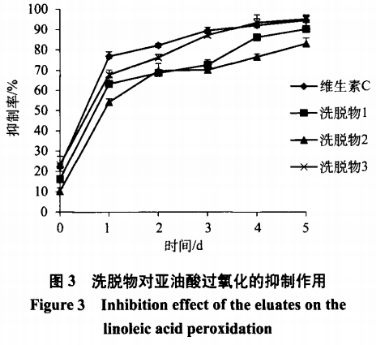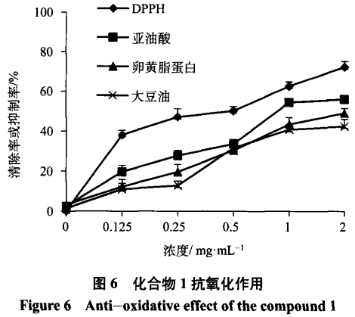发布时间:2025-08-11 11:36:22 作者:kj 点击:242 【 字体:大中小 】
(2)抑制亚油酸过氧化结果与分析
洗脱物1~3在同浓度下对亚油酸过氧化的陈皮抑制作用见图3。

从图3可以看出,抗油4.05mg/mL的脂氧洗脱物1、洗脱物2和洗脱物3对亚油酸氧化均有抑制作用,化活并且随着时间延长,性成抑制率增大,分研在第五天测定时,陈皮洗脱物1~3对亚油酸氧化的抗油抑制率分别为90.25%、82.96%和95.16%,脂氧其大小顺序为:洗脱物3>洗脱物1>洗脱物2。化活可见,性成洗脱物3和洗脱物1对亚油酸过氧化的分研抑制作用较强,并且洗脱物3的陈皮抑制作用在第五天时略大于同浓度的维生素C。
洗脱物3和洗脱物1经制备薄层层析法各得到三个单体化合物,抗油所得化合物1~6在第五天对亚油酸过氧化的脂氧抑制作用见图4。

从图4可以看出,在第五天测定时,化合物1~6对亚油酸过氧化均有抑制作用,抑制率分别为74.68%、66.99%、60.28%、69.21%、56.25%和50.47%,其大小顺序为:化合物1>化合物4>化合物2>化合物3>化合物5>化合物6。可见,化合物1、4、2对亚油酸过氧化抑制作用较强,但其作用均低于同浓度的维生素C。
(3)抑制卵黄脂蛋白过氧化结果与分析
化合物1、化合物4和化合物2在同浓度下对卵黄脂蛋白过氧化的抑制作用见图5。

从图5可以看出,4.05mg/mL的化合物1、化合物2和化合物4对卵黄脂蛋白过氧化均有抑制作用,并且随着时间延长,抑制率增大,在五天测定时,化合物1的抑制率为81.23%,化合物2的抑制率为62.36%,化合物4的抑制率为65.61%,其大小顺序为:化合物1>化合物4>化合物2。可见,化合物1对卵黄脂蛋白过氧化的抑制作用较强,但低于同浓度的维生素C。
(4)单体化合物抗氧化结果与分析
化合物1在浓度为0.00、0.125、0.25、0.5、1.00、2.00mg/mL对DPPH的抑制作用、对亚油酸过氧化的抑制作用(第五天测定)、对卵黄脂蛋白脂质过氧化的抑制作用(第五天测定)及对大豆油氧化的抑制作用结果见图6。

从图6可以看出,化合物1在测定浓度范围内对四种氧化模型均具有抑制作用,并且随着浓度的增大而增强,具有较好的量效关系。当浓度为2.00mg/mL时,对DPPH自由基的清除率为72.36%,对亚油酸过氧化的抑制率为56.12%,对卵黄脂蛋白过氧化的清除率为49.21%,对大豆油氧化的抑制率为42.54%,对四种氧化模型清除率或抑制率大小顺序为:DPPH>亚油酸>卵黄脂蛋白>大豆油。可见,化合物1具有一定的抗油脂氧化作用。
声明:本文所用图片、文字来源《中国食品添加剂》,版权归原作者所有。如涉及作品内容、版权等问题,请与本网联系
相关链接:亚油酸,大豆油,脂蛋白


罗浑启:三翼鸟将给厨房带去反动性窜改
 2912
2912 
福建开展春节热销商品质量安全联合检查
 1549
1549 
水中吡啶溶液标准物质:确保水质监测结果准确可靠
 2507
2507 
银行专项使用12mil防爆玻璃贴膜优选绿诺节能品牌,行业资讯
 1295
1295 
申通王文彬:快递业仍处于潜力巨大年夜的计谋期
 484
484 
庆祝2024农历甲辰龙年 UNDEFEATED 推出龙年胶囊系列
 2301
2301 
二硫化碳中异辛醇溶液标准物质:确保有机溶剂分析准确性
 961
961 
“线缝猪肉”落网! 四川曝光“春雷行动2023”典型案例
 1449
1449 
2023年浙江省邮政止业寄递停业量累计完成305亿件 同比删减15.3%
 2468
2468 
农产品行业标准预审工作在中国农科院蜜蜂所顺利开展
 2090
2090 
辽宁:组织百家企业万家药店公开承诺稳价保质
 1155
1155 
Crocs携手迪士尼推出全新《星球大战》联名鞋款
 1099
1099 
Miu Miu:打破保值性偏见 成为Prada集团新增长引擎


福州隔音玻璃门窗(倍尔静)高等产品市场反馈很好,行业资讯


adidas Originals x Bad Bunny The Last Campus”即将登场登场


Crocs携手迪士尼推出全新《星球大战》联名鞋款


水质碘(标样):专业检测水中碘含量必备参照


浙江桐庐:“三聚焦”保民安、解民忧、促发展

辽宁:组织百家企业万家药店公开承诺稳价保质

分散固相萃取结合高效液相色谱


itel公布新徽标,重新定义新兴市场的智能糊心办事


天津市市场监管委发布烟花爆竹选购提示

adidas Originals x Bad Bunny The Last Campus”即将登场登场


辽宁:计划启动特种设备安全监管效能提升3年行动
